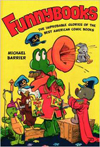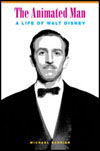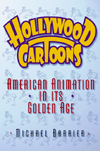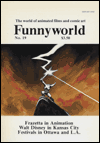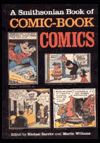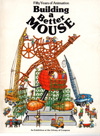
Commentary
I could call this section "reviews," but it's not really intended as a consumer guide. I suspect, and even hope, that many of the visitors to this Web site will have already seen the films and DVDs and read the books that I write about. Think of this section as one side of a conversation devoted to things we both care about—and probably disagree about, often as not.
These are the subjects of my commentaries:
Books: Walt Kelly: The Life and Art of the Creator of Pogo is a lavishly illustrated tribute to the great cartoonist. New collections bring early Floyd Gottfredson Mickey Mouse comic strips and the first two issues of Walt Disney's Comics & Stories back into print. South of the Border with Disney and Two Guys Named Joe are impressive examples of what I call The Approved Narrative. The Art of Pixar Short Films and The Alchemy of Animation are two intriguingly different products of Disney's "walled garden." Tex Avery: A Unique Legacy (1942-1955) is academic writing about animation at its worst. The Colored Cartoon: Black Representation in American Animated Short Films, 1907-1954 may take some racial stereotypes a little too seriously. Schulz and Peanuts doesn't do justice to the great cartoonist who is its subject. The Hanna-Barbera Treasury: Rare Art and Mementos from Your Favorite Cartoon Classics is an impressive tribute to an unimpressive studio. Neal Gabler's Walt Disney: The Triumph of the American Imagination is a good deal less than a triumph; the list of its errors is remarkably long for a book that was supposedly "meticulously researched." Amid Amidi's Cartoon Modern: Style and Design in Fifties Animation is a beautiful tribute to the modern-design cartoons of the 1950s. John Benson's Romance Without Tears offers nineteen beautifully reprinted romance-comic stories, written by Dana Dutch for the St. John company more than fifty years ago. John Hench's Designing Disney hasn't answered my decades-old question about Disneyland. John Canemaker's The Art and Flair of Mary Blair: An Appreciation makes the strongest possible case for its subject's importance as an artist—but is it strong enough? Hollywood Flatlands: Animation, Critical Theory and the Avant-Garde is really about something other than animation. The Animator's Survival Kit and Walt Disney's Nine Old Men and the Art of Animation open up very large and troubling questions, about Disney animation in particular. The Hand Behind the Mouse does the memory of its adored subject, Ub Iwerks, no favors. The Immediate Experience and Reading the Funnies are revealing of how the comics have suffered from snobbery.
Movies and DVDs: Tangled is a hopeful sign for CGI animation, especially in the handling of one of its characters. Fantastic Mr. Fox and The Princess and the Frog are two very different animated features, one of which is surprisingly encouraging. Unlike most people, I found Up to be a downer. Bolt and Madagascar Escape 2 Africa fall short in different ways. Kung Fu Panda and WALL•E have a great deal to say about computer animation's limitations. Beowulf demonstrates anew the limitations of motion capture. Ratatouille is a problematic but exhilarating Pixar feature. Watching Happy Feet was not a happy experience. The new "Walt Disney Legacy Collection" sets devoted to the True-Life Adventures are a lot of fun to watch, and not just because the True-Lifes themselves look so good.. Monster House and A Scanner Darkly are a couple of interesting dead ends. Cars is Pixar's first out-and-out wreck. Chicken Little is puny indeed. Howl's Moving Castle is a step down from Miyazaki's previous film. In Madagascar, DreamWorks finally comes up with a winner. Much maligned by people in the animation world, The Polar Express is really an extraordinary film, especially in Imax 3D. The SpongeBob SquarePants Movie is a TV cartoon on the big screen. The Incredibles and Shark Tale embody two very different approaches to computer animation. Some of Walt Disney's live-action features are surprisingly good. Shrek 2, like the original, has that Puppetoons look. Home on the Range brings down the curtain on almost seventy years of hand-drawn Disney animated features. The Triplets of Belleville may lack "appeal," but if so, that's exactly the way that Sylvain Chômet wants it.The two volumes of The Films of Michael Sporn collect the work of an underappreciated creator. Frank and Ollie tells us more about Thomas's and Johnston's happy home life than about their artistry. Sinbad: Legend of the Seven Seas needs a hero at the helm, but has only a movie star instead. Is there a shadow over Finding Nemo's success? The three 2002 releases in the Walt Disney Treasures series are all winners. Monsters, Inc. is in many ways a delightful film—why don't I like it better? Lilo and Stitch is halfway to being wonderful. Spirit steps in it. Treasure Planet is no jewel. The marketing slogan for Looney Tunes: Back in Action might as well be, "May the farce be with you." Brother Bear is too smart for its own good. American Splendor brings Harvey Pekar to the screen—but which Harvey?
Museum Exhibitions: A California university library devoted exhibit space to "Celebrating Comic Books," Carl Barks's work in particular. "Il Était Une Fois...Walt Disney," a huge exhibition in Paris and Montréal, had wonderful things on view, but you had to watch out for those wall texts. "Masters of American Comics" was distressingly lacking in mastery of its subject.
Television Animation: The Ren & Stimpy Adult Cartoon Party is a cartoon, all right, but it's not adult, and watching it didn't put me in a party mood.
From the Archives: Winsor McCay: His Life and Art, by John Canemaker, is one of the best books ever published on animation and comic art—and it has just returned to print in a sumptuous revised edition. I'm reprinting here a review that I wrote for The Comics Journal when Winsor McCay first appeared in 1987. I'll occasionally reprint other reviews of books and films that I think are worth another look.
Quick Links
New to the site? Click here to go to a page that explains what it's all about.
To comment on anything on the site, write to me at the following address: michaelbarrier@comcast.net. I’ll assume that your comments are intended for publication unless you specify otherwise.
